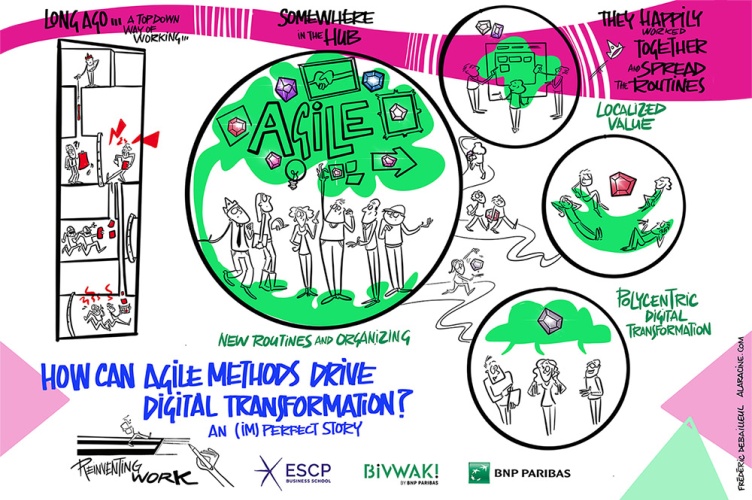The role of agility to organise and change work practices A fascinating project launched in April 2021
Research context
Digital transformation is usually driven from the top down by IT systems which enforce new work practices. It is hoped that these systems can align the business operations with the strategic goals of an organisation. The onus of the change depends on the adoption of the IT as imagined or expected by strategy and the acceptance by the employees for such a change. In contrast, we are interested in Bivwak’s way to induce digital transformation at BNP Paribas because it does not follow a typical process that relies on IT systems. In particular, what we see is an attempt to create polycentric digital transformation, to prepare the organisation for digitalisation. There are many potential advantages to such polycentric transformation (e.g., scaling, local adaptation, costs) and issues (conflicts with procedural thinking, management control, meaning of work).
Research question
How can agile methodologies contribute to an organization’s digital transformation?
Methodology and milestones
19 interviews were conducted with 15 hub members (11 project workers, 4 hub staff) and 4 employees from other departments involved in agile deployment across the bank.
Questions focused on four areas: participants' background and role, the hub's role in the bank, specific hub projects, and work dynamics within the hub.
Research team
- Daniel Curto-Millet (University of Gothenburg)
- Almudena Cañibano (ESCP, Paris campus)
- Lukas Rojahn (ESCP, Paris campus)
Research keytake aways
- Digital transformation does not only happen in a top-down approach, but through a process we call ‘polycentric digital transformation’
- Polycentric digital transformation creates small pockets that drive change in an organization to digitally transform it
- Digital transformation does not need to happen through the adoption of technology. As this case shows, it is agile methodologies that attempt to achieve digital transformation at a larger scale
- Digitally transforming an organization through agile methodologies puts the onus of transformation on those promoting agile methodologies through their use
- Agile-based digital transformation reconfigures the organization’s identity, how employees relate to each other and the organization with accrued desires of autonomy that disrupt traditional managerial expectations. Attention points Digital transformation, agile methodologies, institutional entrepreneurship
Key outcomes
Published academic papers
■ Curto-Millet, D; Cañibano, A. (2024). “Digital transformation: An agile, polycentric, bottom-up approach”, European Group of Organization Studies conference, Milan, Italy
■ Rojahn, L. (2022). Agility at scale – Success factors and challenges at the organisational and team level and its effect on wellbeing – a banking case, Master in Management, MSc dissertation, ESCP
Campuses
